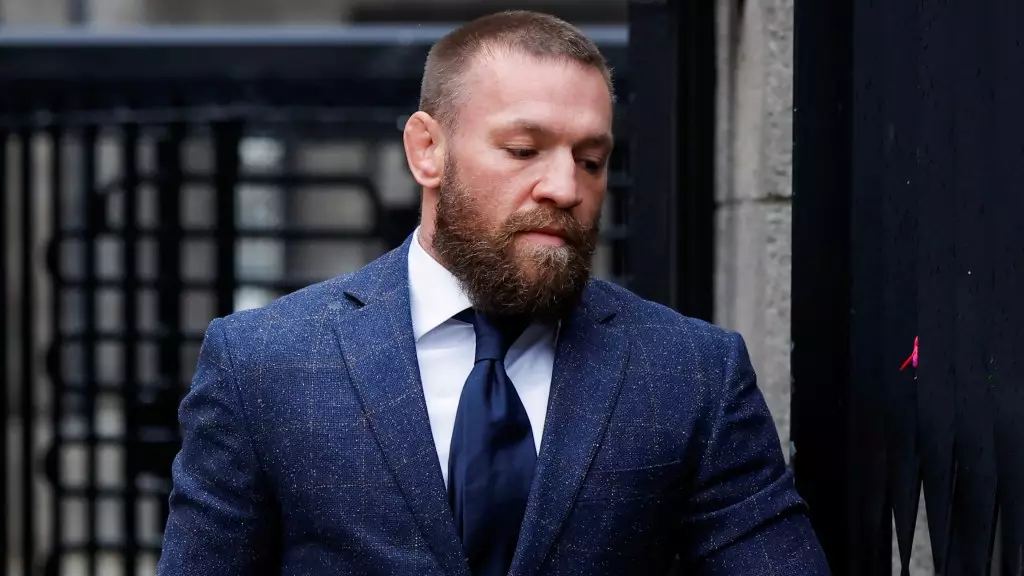The civil trial involving UFC celebrity Conor McGregor has been a focal point of media attention as it unfolds in Dublin. The case centers around serious allegations of sexual assault made by Nikita Hand against McGregor and his associate James Lawrence. Hand accuses the duo of engaging in non-consensual sex while she was intoxicated following a night of partying in December 2018. The complexities of the case are further heightened by the mixture of criminal elements that were never formally pursued, which eventually led to Hand filing a civil lawsuit in early 2021. This situation raises profound questions about consent, memory, and the intersection of celebrity and accountability in serious criminal allegations.
The Legal Dynamics in the Courtroom
As the trial progresses, it has been marked by dramatic testimonies and cross-examinations, bringing forth a wealth of conflicting narratives. McGregor’s time on the witness stand was particularly notable for its emotional intensity; he vehemently denied the accusations, denouncing them as fabrications. His insistence that the sexual encounter with Hand was consensual adds layers of complexity to the case, as jurors must weigh his defense against the gravity of Hand’s allegations.
During the proceedings, defense attorney Remy Farrell emphasized the importance of evaluating the evidence over public perception. He spotlighted the inconsistencies in Hand’s recollection of events and referenced witness testimonies that did not support her claims, including those of Danielle Kealey, a co-worker of Hand’s who reportedly did not observe any signs of distress. This aspect attempts to shift the narrative from McGregor being merely a celebrity in a sensational trial to a defendant impacted by the vagaries of human memory and perception.
The testimonies from both McGregor and Lawrence varied strikingly. Lawrence, in his first public account, described events from that night, asserting that he did not use cocaine and that the encounters were consensual. His claims regarding Hand displaying verbal and physical initiative contrast sharply with Hand’s perspective, where she expressed a lack of memory of the events. This contradiction raises crucial questions about what constitutes consent, especially in the complicated terrain navigated when intoxication is involved.
Furthermore, Lawrence’s assertion that he willingly engaged with Hand and that she seemed unharmed oddly juxtaposes with the medical testimonies indicating injuries and trauma. The evidence presented by emergency responders, who assessed Hand post-incident, adds weight to the prosecution’s narrative, as they described her condition as severe. The presence of physical bruising and an emergency medical situation complicates Lawrence’s claims, creating a discrepancy that jurors will need to unravel.
This trial also amplifies discussions about celebrity culture, power dynamics, and the societal implications of such high-profile allegations. The fascination surrounding McGregor, combined with his reluctance to address critical inquiries from law enforcement, highlights how fame can intersect with the legal narrative. McGregor’s admission of drug use during the events in question introduces a different angle, provoking debates about accountability and the reliability of memory under altered states of consciousness.
The emotional dimensions of the allegations not only impact the parties involved but resonate throughout the public and media discourse. As Hand’s attorney highlighted, the psychological aftermath of the incident—citing PTSD symptoms—impacts real lives, and the monetary damages sought signal the serious repercussions of the alleged events.
Final Arguments and the Jury’s Role
With the trial approaching its conclusion, closing arguments from each side encapsulate the dichotomous nature of the case. Hand’s legal team pushes for recognition of the alleged trauma endured, while McGregor’s defense strives to frame the narrative of inconsistencies and the requisite burden of proof on Hand’s side. The jurors now face the significant responsibility of deciding a case that is not only about the individuals involved but also represents broader societal issues of justice, gender dynamics, and the ethos surrounding celebrity.
As deliberations approach, the outcome of this trial could leave lasting implications not just for McGregor and Lawrence, but also for the ongoing societal discourse surrounding consent, celebrity accountability, and legal processes in cases of sexual assault. Regardless of the verdict, the events surrounding this case will likely echo in discussions of similar incidents throughout the legal landscape.

